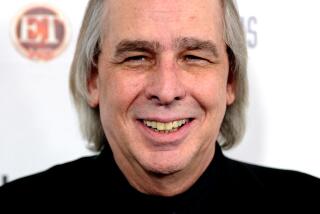And Another One Bites the Dust . . . : Radio: KNAC, the ‘official’ outlet for the metal scene, is being sold. A dwindling audience will miss it.
- Share via
There’s the old joke about banging your head against the wall just because it feels good when you stop.
Local head-bangers aren’t feeling good at all about the news that KNAC-FM (105.5) is going to stop playing their favored heavy-metal music. The station is being sold and probably will switch to an all-Spanish format in February.
“I feel like a piece of my past is leaving,” says Lonn Friend, former editor of the hard-rock magazine Rip and now the West Coast vice president of artists and repertoire for Arista Records. “From traveling around the country, I can tell you there aren’t many stations like KNAC, and to lose the one in L.A. is sad,” says Bruce Duff, publicist for L.A.-based Triple X Records and a veteran hard-rock and punk musician.
But even they acknowledge that KNAC’s place in the music community had slipped in recent years, as the popularity of such hard-edged “grunge” bands as Pearl Jam and Nirvana supplanted that of such past hard-rock staples as Motley Crue and Ozzy Osbourne.
“The L.A. hard-rock community has been virtually nonexistent for the last several years,” Friend says. “What KNAC was doing was keeping alive some of the music that was prevalent here for a while, but the culture has so changed around hard-rock music that not even a special-interest, small-but-important station can survive the social and musical upheaval.”
It’s a dramatic change from the recent past. It didn’t take KNAC long after switching to a heavy-metal format in 1986 to become an unavoidable presence in L.A. as the official outlet for the then-strong metal scene--despite a relatively weak signal. Balancing classic metal-heads like Black Sabbath with a newer generation led by Metallica and Megadeth, KNAC led the charge of hard-rock into the pop chart mainstream.
Bumper stickers and T-shirts with the stations’ logo were ubiquitous symbols of rock rebelliousness as the station withstood a challenge from a similarly toned Pirate Radio that failed to encroach on its market a few years ago. “KNAC was recognized throughout the world as the premiere hard-rock station,” says Greg Sorrels, hard-rock editor for the music industry trade magazine Album Network. “You could see looking in magazines and on TV all the stars that used to wear their shirts. I was still in Oklahoma six years ago and I knew what KNAC was.”
As recently as two years ago, KNAC still seemed ahead of the competition in terms of grabbing on to new, hard-edged bands, including Alice in Chains and Soundgarden. But with the alternative-rock explosion, more powerful KROQ-FM (106.7) took the lead in that realm, making those and other adventurous, hard-edged acts like Nine Inch Nails central to its playlist. KNAC, meanwhile, seemed slow to program such upstarts as Green Day and the Offspring.
Many KNAC regulars do not get played on KROQ, though, and the metal station’s demise will leave a void, fans fear. “In the entire region you won’t be able to hear Pantera, Corrosion of Conformity, Biohazard,” Friend says. “No one’s going to play that music, and with no support from MTV for those heavier acts, it’s going to become harder to get that music to people.”
The most immediate impact may be on the concert circuit, where promoters often rely on radio exposure and co-promotions to help sell tickets. “It’s going to be real tough now,” says John Reese of BFD Management, whose clients include KNAC regulars Guns ‘N Roses and Danzig. “There’s really no other hard-rock forum for somebody to get the word out, play the music and promote the shows.”
Metal mongers are hoping that another station will pick up the slack. One possibility is KLOS-FM (95.5), which has favored a more pop-oriented end of rock, but has recently added newer, harder bands to its programming.
“About three months ago, we started to pick up the tempo and pace of the music and made a noticeable increase in the current records we’re playing,” says KLOS program director Carey Curlop. “We stand to pick up a good portion of ex-KNAC listeners. . . . And there will be more concert promotion opportunities for us and a need for us to help support some of those bands.”
And, some believe that KNAC’s demise could actually help revitalize the local hard-rock scene, where a new, core fan-base can be developed.
“If the only access to music is in performance, that’s the only place for the kids to go out and be exposed to it,” Friend says. “This could spur a revitalization of the hard-rock clubs in Southern California and could really help the unsigned bands--kids will go see them because it’s a cheap ticket.”
More to Read
The biggest entertainment stories
Get our big stories about Hollywood, film, television, music, arts, culture and more right in your inbox as soon as they publish.
You may occasionally receive promotional content from the Los Angeles Times.










